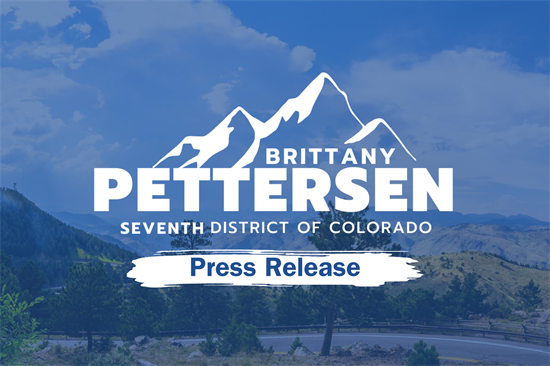Press Releases
Pettersen Bill to Prevent the Financing of Illegal Synthetic Drugs Passes Senate, Heads to President’s Desk for Signature
Washington,
July 29, 2024
WASHINGTON— The United States Senate last week passed U.S. Representative Brittany Pettersen’s bipartisan legislation to prevent the financing of illegal synthetic drugs. Pettersen introduced the bill alongside Monica De La Cruz (R-TX), and Andy Ogles (R-TN), and it passed the House of Representatives in May of 2023. The bill is now headed for the President’s desk to be signed into law.
The Preventing the Financing of Illegal Synthetic Drugs Act (H.R. 1076) directs the Comptroller General of the United States to study and report on illicit financing associated with synthetic drug trafficking. The study will lay out for Congress the business model of the organizations carrying out the trafficking, how they move and hide their illicit gains, and what the U.S. government can do to thwart fentanyl money laundering. According to the Centers for Disease Control and Prevention, over 107,000 people in the United States died from drug overdoses or poisonings in 2023, with 75% of those deaths involving synthetic opioids like fentanyl. “I know from experience what American families are facing because of our worsening opioid crisis. My mother struggled with an opioid addiction for 30 years, and I came to Congress to combat this public health crisis at the source,” said Pettersen. “Deaths involving synthetic opioids, such as illicit fentanyl and methamphetamine, increased by 22 percent in 2021, and continue to rise in the U.S. and globally. If we want to reverse the current trends, an important first step is stopping the organizations that are trafficking these drugs into our communities. This bill will shed light on the finances of these organizations, and I’m proud this important work was signed into law.” Full text of the bill can be found here. Inspired by her own mother’s struggle, this bill is just the latest in Pettersen’s ongoing efforts to address the drug epidemic in the United States. These include measures to prevent the import of illicit drugs, and prevent overdose deaths by ensuring airplanes, law enforcement, and hospitals are able to distribute naloxone when necessary. |



